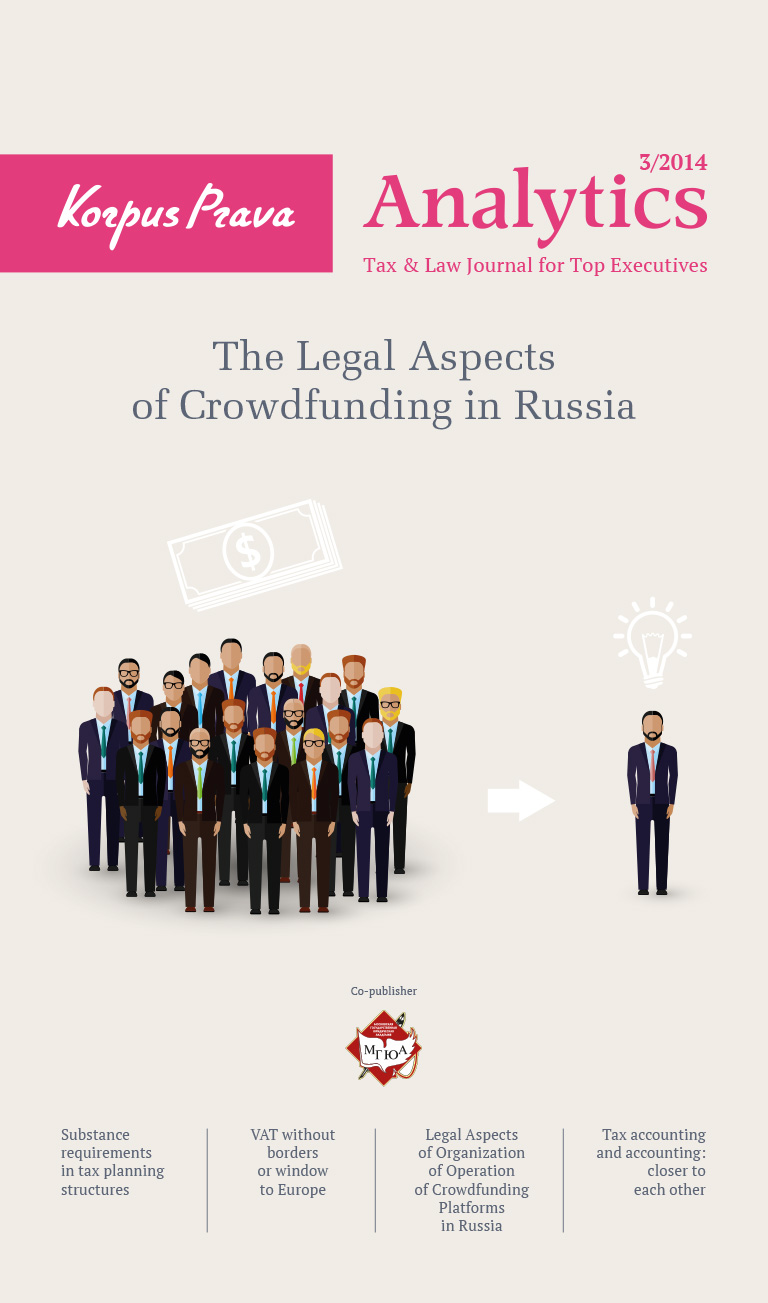- Cyprus Citizenship Scheme for Foreign Investors
- Squeezed But Pleased: Taxation of Passive Income in the European Union
- VAT Without Borders or Window to Europe
- Legal Aspects of Organization of Operation of Crowdfunding Platforms in Russia
- Substance Requirements in Tax Planning Structures
- “Deposit Splitting” of Individuals. Legal Civil and Criminal Aspects
Criminal Liability for Crimes in the Sphere of Business and Other Economic Activities
Under the current legislation, any crime is punished with the criminal liability. However, crimes pose different levels of danger to the community, e.g. some crimes endanger lives and well-being, and their consequences are often impossible to compensate, while others endanger state economic interests and assets, and damages imposed thereby may be compensated.
Due to the different nature of crimes, the Russian criminal legislation introduces article 76.1 of the Criminal Code of the Russian Federation on the exemption from criminal liability in cases of economic crimes.
It is deemed as a compromise norm, because it allows a wrongdoer to avoid criminal liability and get mitigation of punishment by performing post-criminal actions aimed at the reparation of the damage done.
The said norm of the Criminal Code was introduced as part of the general concept of humanizing the criminal policy by Federal Law No. 420-ФЗ On amendments to the Criminal Code of the Russian Federation and certain legal acts of the Russian Federation dated 07.12.2011. Article 76.1 of the Criminal Code of the Russian Federation provides for the exemption of persons who committed an economic crime for the first time, provided the damage done by unlawful actions is reimbursed in full.
The demand for this norm existed long before its introduction, however, current events demonstrate its insufficiency. Thus, on December 13, 2017, the Federation Council discussed humanization of the criminal legislation and suggested mitigation of sanctions for crimes of low-to-medium severity by compensation of pecuniary damage incurred by the offended. One also suggested decriminalization of business and economic crimes. For example, these are crimes committed through faults in carrying out economic activities, which pose no danger to the society.
Experts who made their reports on December 13 at the Federation Council analysed sentences under article 22 of the Criminal Code of the Russian Federation (economic crimes), article 159 of the Criminal Code of the Russian Federation (fraud), article 160 of the Criminal Code of the Russian Federation (embezzlement or squandering committed using official position) and discovered that in the majority of sentences entrepreneurs made mistakes which posed no danger to the public, and consequently, there was no need in criminal punitive measures.
It should be noted that the step towards decriminalization of economic crimes was successfully taken in 2016, when the State Duma of the Russian Federation adopted the draft law on the partial decriminalization of economic crimes.
Such changes as the increase of the minimum damage for criminal case initiation on economic crimes were introduced, as these minimum levels have not changed since early 2000s and do not comply with current circumstances. Moreover, the minimum amount of unpaid taxes and levies for criminal case initiation on tax-related crimes was doubled, i.e. from 1.8 million to 2.7 million roubles. Certain amendments were introduced to the Criminal Procedure Code of the Russian Federation, which, from the moment of arrest or house arrest, grant the suspect or the accused the right to unlimited in time and number meetings with their notaries for the execution of the power-of-attorney for the right of interest representation in the business sphere.
Due to the draft law, sanctions under part 4, article 180 of the Criminal Code of the Russian Federation for the illegal use of means of individualization for goods, works or services committed by a group of persons in collusion were mitigated.
The urgent demand for decriminalization of economic crimes is determined by the fact that these crimes are deemed as the daily bread for law enforcement authorities. At the moment, when a person chooses between the registration of an enterprise and illegal economic activities, he chooses the latter, as it is much more difficult to be brought to justice for shady business activities, than in the situation when an entrepreneur is constantly monitored by law enforcement authorities. Consequently, decriminalization of economic crimes will allow inter alia cutting down corrupt practices of law enforcement authorities.
However, there is a different opinion on this issue. The analysis of legal precedents shows that accusing law enforcement authorities of undue pressure is not justified. For example, statistics show that for the last decade the number of business and other economic crimes decreased by 60%.

The number of economic crime perpetrators whose criminal cases came to court also decreased by 61%.

The analysis of legal precedents allows to make a conclusion that the number of persons convicted for economic crimes decreased by 58.8%.

The analysis of legal precedents for identifying sentences in such cases makes it clear that judges pass sentences on quite a liberal basis. Thus, in 2015, only 17% of the convicted for economic crimes were sentenced to imprisonment.
However, as noted above, the criminal legislation requires certain revision. It appears that there is a need for decriminalization of business and economic crimes.
At the moment, the Federation Council develops a new concept of the Russian criminal policy, so there is hope for humanization of the criminal legislation.
Your subscription to our journal will definitely boost the efficiency of your specialists and downsize your expenses for consultants.
The journal is available free of charge in the electronic version.
Free Download

